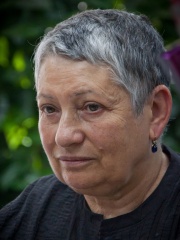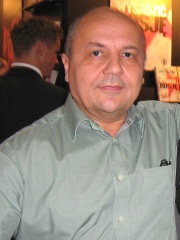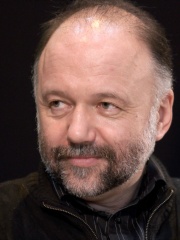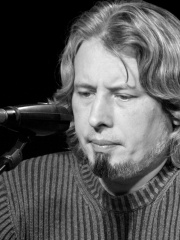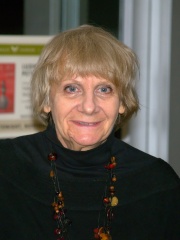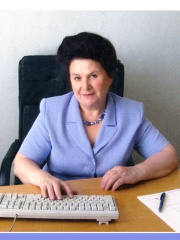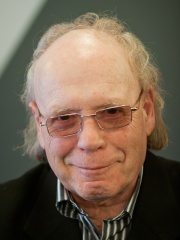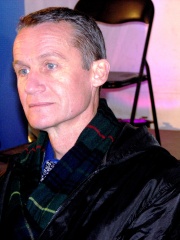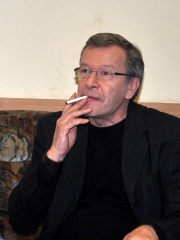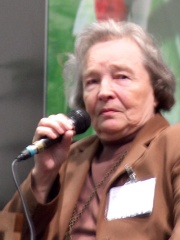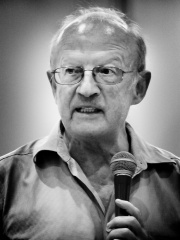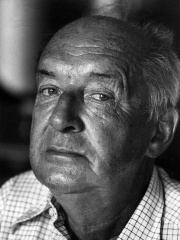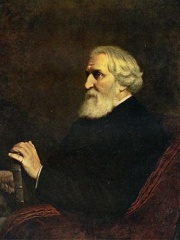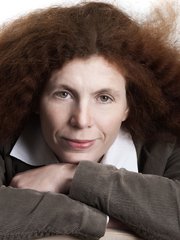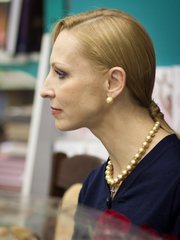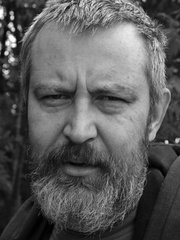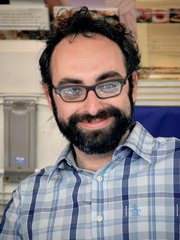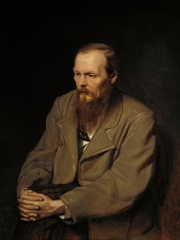
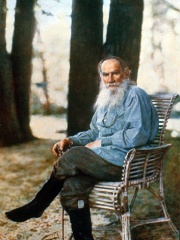

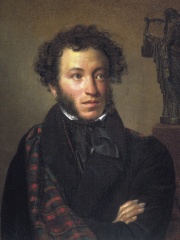
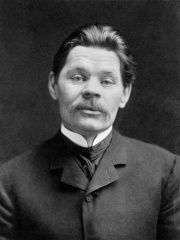



The Most Famous
WRITERS from Russia
Top 10
The following people are considered by Pantheon to be the top 10 most legendary Russian Writers of all time. This list of famous Russian Writers is sorted by HPI (Historical Popularity Index), a metric that aggregates information on a biography's online popularity. Visit the rankings page to view the entire list of Russian Writers.

1. Fyodor Dostoevsky (1821 - 1881)
With an HPI of 93.20, Fyodor Dostoevsky is the most famous Russian Writer. His biography has been translated into 178 different languages on wikipedia.
Fyodor Mikhailovich Dostoevsky (11 November [O.S. 30 October] 1821 – 9 February [O.S. 28 January] 1881) was a Russian philosopher, novelist, short story writer, essayist and journalist. He is regarded as one of the greatest novelists in both Russian and world literature, and many of his works are considered highly influential masterpieces. Dostoevsky's literary works explore the human condition in the troubled political, social and spiritual atmospheres of 19th-century Russia, and engage with a variety of philosophical and religious themes. His most acclaimed novels include Crime and Punishment (1866), The Idiot (1869), Demons (1872), The Adolescent (1875) and The Brothers Karamazov (1880). His Notes from Underground, a novella published in 1864, is considered one of the first works of existentialist literature. Born in Moscow in 1821, Dostoevsky was introduced to literature at an early age through fairy tales and legends and through books by Russian and foreign authors. His mother died in 1837, and around the same time, he left school to enter the Nikolayev Military Engineering Institute (later renamed the Military Engineering-Technical University). After graduating, he worked as an engineer and briefly enjoyed a lavish lifestyle, translating books to earn extra money. In the mid-1840s, he wrote his first novel, Poor Folk, which gained him entry into Saint Petersburg's literary circles. However, he was arrested in 1849 for belonging to a literary group, the Petrashevsky Circle, that discussed banned books critical of Tsarist Russia. Dostoevsky was sentenced to death, but the sentence was commuted at the last moment. He spent four years in a Siberian prison camp, followed by six years of compulsory military service in exile. In the following years, Dostoevsky worked as a journalist, publishing and editing several magazines of his own and later A Writer's Diary, a collection of his writings. He began to travel around Western Europe and developed a gambling addiction, which led to financial hardship. For a time, he had to beg for money, but he eventually became one of the most widely read and highly regarded Russian writers. Dostoevsky's body of work consists of thirteen novels, three novellas, seventeen short stories, and numerous other works. His writings were widely read both within and beyond his native Russia, influencing an equally great number of later writers, including Russians such as Aleksandr Solzhenitsyn and Anton Chekhov, the philosophers Friedrich Nietzsche, Albert Camus, and Jean-Paul Sartre, and the emergence of Existentialism and Freudianism. His books have been translated into more than 170 languages, and served as the inspiration for many films.

2. Leo Tolstoy (1828 - 1910)
With an HPI of 89.82, Leo Tolstoy is the 2nd most famous Russian Writer. His biography has been translated into 183 different languages.
Count Lev Nikolayevich Tolstoy (; Russian: Лев Николаевич Толстой, IPA: [ˈlʲef nʲɪkɐˈla(j)ɪvʲɪtɕ tɐlˈstoj] ; 9 September [O.S. 28 August] 1828 – 20 November [O.S. 7 November] 1910), usually referred to in English as Leo Tolstoy, was a Russian writer. He is regarded as one of the greatest and most influential authors of all time. Born to an aristocratic family, Tolstoy achieved acclaim in his twenties with his semi-autobiographical trilogy, Childhood, Boyhood and Youth (1852–1856), and with Sevastopol Sketches (1855), based on his experiences in the Crimean War. His War and Peace (1869), Anna Karenina (1878), and Resurrection (1899), which is based on his "youthful sins," are often cited as pinnacles of realist fiction and three of the greatest novels ever written. His oeuvre includes short stories such as "Alyosha the Pot" (1911) and "After the Ball" (1911) and novellas such as Family Happiness (1859), The Death of Ivan Ilyich (1886), The Kreutzer Sonata (1889), The Devil (1911), and Hadji Murat (1912). He also wrote plays and essays concerning philosophical, moral and religious themes. In the 1870s, Tolstoy experienced a profound moral crisis, followed by what he regarded as an equally profound spiritual awakening, as outlined in his non-fiction work Confession (1882). His literal interpretation of the ethical teachings of Jesus, centering on the Sermon on the Mount, caused him to become a fervent Christian anarchist and pacifist. His ideas on nonviolent resistance, expressed in such works as The Kingdom of God Is Within You (1894), had a profound impact on such pivotal 20th-century figures as Mahatma Gandhi, Ludwig Wittgenstein, Martin Luther King Jr., and James Bevel. He also became a dedicated advocate of Georgism, the economic philosophy of Henry George, which he incorporated into his writing, particularly in his novel Resurrection (1899). Tolstoy received praise from countless authors and critics, both during his lifetime and after. Virginia Woolf called Tolstoy "the greatest of all novelists", and Gary Saul Morson referred to War and Peace as the greatest of all novels. He received nominations for the Nobel Prize in Literature every year from 1902 to 1906 and for the Nobel Peace Prize in 1901, 1902, and 1909. Tolstoy never being awarded a Nobel Prize remains a major Nobel Prize controversy.

3. Anton Chekhov (1860 - 1904)
With an HPI of 86.67, Anton Chekhov is the 3rd most famous Russian Writer. His biography has been translated into 168 different languages.
Anton Pavlovich Chekhov (; Russian: Антон Павлович Чехов, [ɐnˈton ˈpavləvʲɪtɕ ˈtɕexəf]; 29 January 1860 – 15 July 1904) was a Russian playwright and short-story writer, widely considered to be one of the greatest writers of all time. His career as a playwright produced four classics, and his best short stories are held in high esteem by writers and critics. Along with Henrik Ibsen and August Strindberg, Chekhov is often referred to as one of the three seminal figures in the birth of early modernism in the theatre. Chekhov was a physician by profession. "Medicine is my lawful wife," he once said, "and literature is my mistress." Chekhov renounced the theatre after the reception of The Seagull in 1896, but the play was revived to acclaim in 1898 by Konstantin Stanislavski's Moscow Art Theatre, which subsequently also produced Chekhov's Uncle Vanya and premiered his last two plays, Three Sisters and The Cherry Orchard. These four works present a challenge to the acting ensemble as well as to audiences, because in place of conventional action Chekhov offers a "theatre of mood" and a "submerged life in the text." The plays that Chekhov wrote were not complex, and created a somewhat haunting atmosphere for the audience. Chekhov began writing stories to earn money, but as his artistic ambition grew, he made formal innovations that influenced the evolution of the modern short story. He made no apologies for the difficulties this posed to readers, insisting that the role of an artist was to ask questions, not to answer them.

4. Alexander Pushkin (1799 - 1837)
With an HPI of 84.64, Alexander Pushkin is the 4th most famous Russian Writer. His biography has been translated into 172 different languages.
Alexander Sergeyevich Pushkin (6 June [O.S. 26 May] 1799 – 10 February [O.S. 29 January] 1837) was a Russian poet, playwright, and novelist of the Romantic era. He is considered by many to be the greatest Russian poet, as well as the founder of modern Russian literature. Pushkin was born into the Russian nobility in Moscow. His father, Sergey Lvovich Pushkin, belonged to an old noble family. One of his maternal great-grandfathers was Abram Petrovich Gannibal, a nobleman and military general of African origin who was kidnapped from his homeland by the Ottomans, then freed by the Russian Emperor and raised in the Emperor's court household as his godson. Alexander Pushkin published his first poem at the age of 15, and was widely recognized by the literary establishment by the time of his graduation from the Tsarskoye Selo Lyceum. Upon graduation from the Lyceum, Pushkin recited his controversial poem "Ode to Liberty", one of several that led to his exile by Emperor Alexander I. While under strict surveillance by the Emperor's political police and unable to publish, Pushkin wrote his most famous play, Boris Godunov. His grand opus novel in verse Eugene Onegin was serialized between 1825 and 1832. Pushkin was fatally wounded in a duel with his wife's alleged lover (her sister's husband), Georges-Charles de Heeckeren d'Anthès, also known as Dantes-Gekkern, a French officer serving with the Russian Chevalier Guard Regiment.

5. Ayn Rand (1905 - 1982)
With an HPI of 83.74, Ayn Rand is the 5th most famous Russian Writer. Her biography has been translated into 86 different languages.
Alice O'Connor (born Alisa Zinovyevna Rosenbaum; February 2 [O.S. January 20], 1905 – March 6, 1982), better known by her pen name Ayn Rand ( ), was a Russian-American writer and philosopher. She is known for her fiction and for developing a philosophical system which she named Objectivism. Born and educated in Russia, she moved to the United States in 1926. After two early novels that were initially unsuccessful and two Broadway plays, Rand achieved fame with her 1943 novel The Fountainhead. In 1957, she published her best-selling work, the novel Atlas Shrugged. Afterward, until her death in 1982, she turned to non-fiction to promote her philosophy, publishing her own periodicals and releasing several collections of essays. Rand advocated reason and rejected faith and religion. She supported rational and ethical egoism as opposed to altruism and hedonism. In politics, she condemned the initiation of force as immoral and supported laissez-faire capitalism, which she defined as the system based on recognizing individual rights, including private property rights. Although she opposed libertarianism, which she viewed as anarchism, Rand is often associated with the modern libertarian movement in the United States. In art, she promoted romantic realism. She was sharply critical of most philosophers and philosophical traditions known to her, with a few exceptions. Rand's books have sold over 37 million copies. Her fiction received mixed reviews from literary critics, with reviews becoming more negative for her later work. Although academic interest in her ideas has grown since her death, academic philosophers have generally ignored or rejected Rand's philosophy, arguing that she has a polemical approach and that her work lacks methodological rigor. Her writings have politically influenced some right-libertarians and conservatives. The Objectivist movement circulates her ideas, both to the public and in academic settings.

6. Maxim Gorky (1868 - 1936)
With an HPI of 82.46, Maxim Gorky is the 6th most famous Russian Writer. His biography has been translated into 113 different languages.
Alexei Maximovich Peshkov (Russian: Алексей Максимович Пешков; 28 March [O.S. 16 March] 1868 – 18 June 1936), popularly known as Maxim Gorky (; Максим Горький), was a Russian and Soviet writer and proponent of socialism. He was nominated five times for the Nobel Prize in Literature. Before his success as an author, he travelled widely across the Russian Empire, changing jobs frequently; these experiences would later influence his writing. He associated with fellow Russian writers Leo Tolstoy and Anton Chekhov, both mentioned by Gorky in his memoirs. Gorky was active in the emerging Marxist socialist movement and later supported the Bolsheviks. He publicly opposed the Tsarist regime and for a time closely associated himself with Vladimir Lenin and Alexander Bogdanov's Bolshevik wing of the Russian Social Democratic Labour Party. During World War I, Gorky supported pacifism and internationalism and anti-war protests. For a significant part of his life, he was exiled from Russia and later the Soviet Union, being critical both of Tsarism and of the Bolsheviks during the Russian Civil War and the 1920s, condemning the latter for political repressions. In 1928 he returned to the USSR on Joseph Stalin's personal invitation and lived there from 1932 until his death in June 1936. After his return he was officially declared the "founder of Socialist Realism". Despite this, Gorky's relations with the Soviet regime were rather difficult: while being Stalin's public supporter, he maintained friendships with Lev Kamenev and Nikolai Bukharin, the leaders of the anti-Stalin opposition executed after Gorky's death; he also hoped to ease the Soviet cultural policies and made some efforts to defend the writers who disobeyed them, which resulted in him spending his last days under unannounced house arrest. Gorky's most famous works are his early short stories written in the 1890s (such as "Chelkash", "Old Izergil", and "Twenty-six Men and a Girl"), the play The Lower Depths, his fictional autobiographical trilogy, My Childhood, In the World, My Universities (1913–1923), and the novel Mother (1906). Gorky himself judged some of these works as failures, and Mother has been frequently criticized; Gorky thought of Mother as one of his biggest failures. However, there have been warmer appraisals of some of his lesser-known post-revolutionary works such as the novels The Artamonov Business (1925) and The Life of Klim Samgin (1925–1936); the latter is considered by some as Gorky's masterpiece and has been viewed by some critics as a modernist work. Unlike his pre-revolutionary writings (known for their "anti-psychologism") Gorky's later works differ, with an ambivalent portrayal of the Russian Revolution and interest in human psychology. Despite the opinions of the critics and scholars, it has been noted that his image and his literary legacy have been greatly compromised by his political career; many of his major works, including the post-revolutionary novels mentioned above, have remained largely unknown in the West.

7. Isaac Asimov (1920 - 1992)
With an HPI of 81.85, Isaac Asimov is the 7th most famous Russian Writer. His biography has been translated into 118 different languages.
Isaac Asimov ( AZ-im-ov; c. January 2, 1920 – April 6, 1992) was an American writer and professor of biochemistry at Boston University. During his lifetime, Asimov was considered one of the "Big Three" science fiction writers, along with Robert A. Heinlein and Arthur C. Clarke. A prolific writer, he wrote or edited more than 500 books. He also wrote an estimated 90,000 letters and postcards. Best known for his hard science fiction, Asimov also wrote mysteries and fantasy, as well as popular science and other non-fiction. Asimov's most famous work is the Foundation series, the first three books of which won the one-time Hugo Award for "Best All-Time Series" in 1966. His other major series are the Galactic Empire series and the Robot series, which include major works such as The Caves of Steel and The Naked Sun, both written in the mid-1950s. The Galactic Empire novels are set in the much earlier history of the same fictional universe as the Foundation series. Later, with Foundation and Earth (1986), he linked this distant future to the Robot series, creating a unified "future history" for his works. He also wrote more than 380 short stories, including the social science fiction novelette "Nightfall", which in 1964 was voted the best short science fiction story of all time by the Science Fiction Writers of America. Asimov wrote the Lucky Starr series of juvenile science-fiction novels using the pen name Paul French. Most of his popular science books explain concepts in a historical way, going as far back as possible to a time when the science in question was at its simplest stage. Examples include Guide to Science, the three-volume Understanding Physics, and Asimov's Chronology of Science and Discovery. He wrote on many other scientific and non-scientific topics, such as chemistry, astronomy, mathematics, history, biblical exegesis, and literary criticism. Asimov was the president of the American Humanist Association. Several entities have been named in his honor, including the asteroid (5020) Asimov, a crater on Mars, a Brooklyn elementary school, Honda's humanoid robot ASIMO, and four literary awards.

8. Aleksandr Solzhenitsyn (1918 - 2008)
With an HPI of 81.48, Aleksandr Solzhenitsyn is the 8th most famous Russian Writer. His biography has been translated into 119 different languages.
Aleksandr Isayevich Solzhenitsyn (11 December 1918 – 3 August 2008) was a Soviet and Russian author and dissident who helped to raise global awareness of political repression in the Soviet Union, especially the Gulag prison system. He was awarded the 1970 Nobel Prize in Literature "for the ethical force with which he has pursued the indispensable traditions of Russian literature". His nonfiction work The Gulag Archipelago "amounted to a head-on challenge to the Soviet state" and sold tens of millions of copies. Solzhenitsyn was born into a family that defied the Soviet anti-religious campaign in the 1920s and remained devout members of the Russian Orthodox Church. However, he initially lost his faith in Christianity, became an atheist, and embraced Marxism–Leninism. While serving as a captain in the Red Army during World War II, Solzhenitsyn was arrested by SMERSH and sentenced to eight years in the Gulag and then internal exile for calling for the overthrow of the Soviet regime in private correspondence with another field officer. As a result of his experience in prison and the camps, he gradually became a philosophically minded Eastern Orthodox Christian. As a result of the Khrushchev Thaw, Solzhenitsyn was released and exonerated. He pursued writing novels about repression in the Soviet Union and his experiences. In 1962, he published his first novel, One Day in the Life of Ivan Denisovich—an account of Stalinist repressions—with approval from Soviet leader Nikita Khrushchev. His last work to be published in the Soviet Union was Matryona's Place in 1963. Following the removal of Khrushchev from power, the Soviet authorities attempted to discourage Solzhenitsyn from continuing to write. He continued to work on additional novels and their publication in other countries including Cancer Ward in 1966, In the First Circle in 1968, August 1914 in 1971 and The Gulag Archipelago—which outraged the Soviet authorities—in 1973. In 1974, he was stripped of his Soviet citizenship and flown to West Germany. He initially moved to Switzerland and then moved to Vermont in the United States with his family in 1976 and continued to write there. His Soviet citizenship was restored in 1990. He returned to Russia four years later and remained there until his death in 2008.

9. Boris Pasternak (1890 - 1960)
With an HPI of 80.01, Boris Pasternak is the 9th most famous Russian Writer. His biography has been translated into 106 different languages.
Boris Leonidovich Pasternak (10 February [O.S. 29 January] 1890 – 30 May 1960) was a Russian and Soviet poet, novelist, and literary translator. Composed in 1917, Pasternak's first book of poems, My Sister, Life, was published in Berlin in 1922 and soon became an important collection in the Russian language. Pasternak's translations of stage plays by Goethe, Schiller, Calderón de la Barca and Shakespeare remain very popular with Russian audiences. Pasternak was the author of Doctor Zhivago (1957), a novel that takes place between the Russian Revolution of 1905 and the Second World War. Doctor Zhivago was rejected for publication in the USSR, but the manuscript was smuggled to Italy and was first published there in 1957. Pasternak was awarded the Nobel Prize in Literature in 1958, an event that enraged the Communist Party of the Soviet Union, which forced him to decline the prize. In 1989, Pasternak's son Yevgeny finally accepted the award on his father's behalf. Doctor Zhivago has been part of the main Russian school curriculum since 2003.
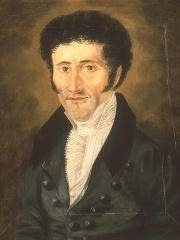
10. E. T. A. Hoffmann (1776 - 1822)
With an HPI of 79.88, E. T. A. Hoffmann is the 10th most famous Russian Writer. His biography has been translated into 66 different languages.
Ernst Theodor Amadeus Hoffmann (born Ernst Theodor Wilhelm Hoffmann; 24 January 1776 – 25 June 1822) was a German Romantic author of fantasy and gothic horror, a jurist, composer, music critic and artist. He is the author of the novella The Nutcracker and the Mouse King, on which Pyotr Ilyich Tchaikovsky's ballet The Nutcracker is based. In addition, his stories form the basis of Jacques Offenbach's opera The Tales of Hoffmann, in which Hoffmann appears (heavily fictionalized) as the hero. The ballet Coppélia is based on two other stories that Hoffmann wrote, while Schumann's Kreisleriana is based on Hoffmann's character Johannes Kreisler. Hoffmann's stories highly influenced 19th-century literature, and he is one of the major authors of the Romantic movement.
People
Pantheon has 302 people classified as Russian writers born between 1465 and 1989. Of these 302, 41 (13.58%) of them are still alive today. The most famous living Russian writers include Lyudmila Ulitskaya, Viktor Suvorov, and Andrey Kurkov. The most famous deceased Russian writers include Fyodor Dostoevsky, Leo Tolstoy, and Anton Chekhov. As of April 2024, 5 new Russian writers have been added to Pantheon including Yulia Latynina, Ilze Liepa, and Oleg Pavlov.
Living Russian Writers
Go to all RankingsLyudmila Ulitskaya
1943 - Present
HPI: 68.11
Viktor Suvorov
1947 - Present
HPI: 65.50
Andrey Kurkov
1961 - Present
HPI: 62.68
Vladimir Sorokin
1955 - Present
HPI: 60.87
Lyudmila Petrushevskaya
1938 - Present
HPI: 59.32
Guzal Sitdikova
1952 - Present
HPI: 59.32
Victor Pelevin
1962 - Present
HPI: 59.00
Edvard Radzinsky
1936 - Present
HPI: 58.88
Andreï Makine
1957 - Present
HPI: 58.69
Viktor Yerofeyev
1947 - Present
HPI: 58.14
Eeva Kilpi
1928 - Present
HPI: 57.91
Andrey Piontkovsky
1940 - Present
HPI: 57.35
Deceased Russian Writers
Go to all RankingsFyodor Dostoevsky
1821 - 1881
HPI: 93.20
Leo Tolstoy
1828 - 1910
HPI: 89.82
Anton Chekhov
1860 - 1904
HPI: 86.67
Alexander Pushkin
1799 - 1837
HPI: 84.64
Ayn Rand
1905 - 1982
HPI: 83.74
Maxim Gorky
1868 - 1936
HPI: 82.46
Isaac Asimov
1920 - 1992
HPI: 81.85
Aleksandr Solzhenitsyn
1918 - 2008
HPI: 81.48
Boris Pasternak
1890 - 1960
HPI: 80.01
E. T. A. Hoffmann
1776 - 1822
HPI: 79.88
Vladimir Nabokov
1899 - 1977
HPI: 79.76
Ivan Turgenev
1818 - 1883
HPI: 79.43
Newly Added Russian Writers (2025)
Go to all RankingsYulia Latynina
1966 - Present
HPI: 49.99
Ilze Liepa
1963 - Present
HPI: 44.89
Oleg Pavlov
1970 - 2018
HPI: 42.44
Kira Yarmysh
1989 - Present
HPI: 37.39
Gary Shteyngart
1972 - Present
HPI: 35.41
Overlapping Lives
Which Writers were alive at the same time? This visualization shows the lifespans of the 25 most globally memorable Writers since 1700.

